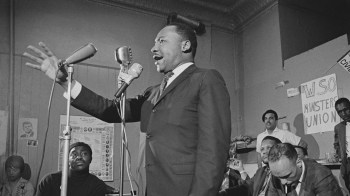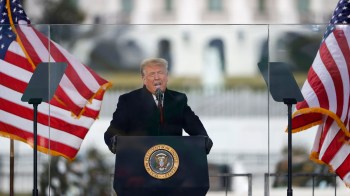Good morning. So far — the president snarls at his critics, Hank Paulson defends his close ties to Wall Street, plus the massive cost of underemployment:
President Obama says he’s a champion for business (Bloomberg)
President Barack Obama said he and his administration have pursued a “fundamentally business- friendly” agenda and are “fierce advocates” for the free market, rejecting corporate criticism of his policies.
“The irony is, is that on the left we are perceived as being in the pockets of big business; and then on the business side, we are perceived as being anti-business.”
“You would be hard-pressed to identify a piece of legislation that we have proposed out there that, net, is not good for businesses,” he added. He predicted that legislation he will sign this year would cut corporate taxes by about $70 billion.
Paulson: My close ties to Wall Street were a huge help (The Raw Story)
“One of the things I brought to the table was understanding markets, understanding what was going on at the different financial institutions,” he continued. “And also, the fact that I’ve been a CEO helped me when it came to the decision-making process. I needed to be talking to the heads of all of the major firms.”
While a strong understanding of markets seems to be an important prerequisite for Treasury chief, ties to Wall Street can create conflicts of interest when making key decisions as banks often prefer different policies than the public.
“I was driven only by one thing, which was an understanding that if the system collapsed, the price would be paid by the American people,” Paulson said. “I certainly didn’t want to be the Treasury Secretary sitting in the seat when that happened.”
The massive cost of underemployment (Felix Salmon)
Slumburbia (New York Times)
Yes, huge developments are empty, with rising crime at the edges, and thousands of homes owned by banks that can’t unload them even at fire-sale prices.
But through it all, the country churns and expands, unlike most other Western democracies. That great American natural resource — tomorrow — will have to save the suburban slums.
Despite glitches, electronics make cars safer (NPR)
“The brakes will function without the computer,” says Paul Kuban, an engineering professor at the University of Southern Indiana. They won’t function as well … because anti-lock braking systems on average do better stopping a car than most human drivers. But they will function.
“It’s gotten to the point where it’s hard to separate the mechanical from the electrical designs because they interact with each other,” says Kuban.
So a car like the Toyota Prius hybrid is just the next step in a future that’s moving toward cars with more electronics and more robotic-type control systems — systems that can analyze driving conditions, and act accordingly.
There’s a lot happening in the world. Through it all, Marketplace is here for you.
You rely on Marketplace to break down the world’s events and tell you how it affects you in a fact-based, approachable way. We rely on your financial support to keep making that possible.
Your donation today powers the independent journalism that you rely on. For just $5/month, you can help sustain Marketplace so we can keep reporting on the things that matter to you.


















